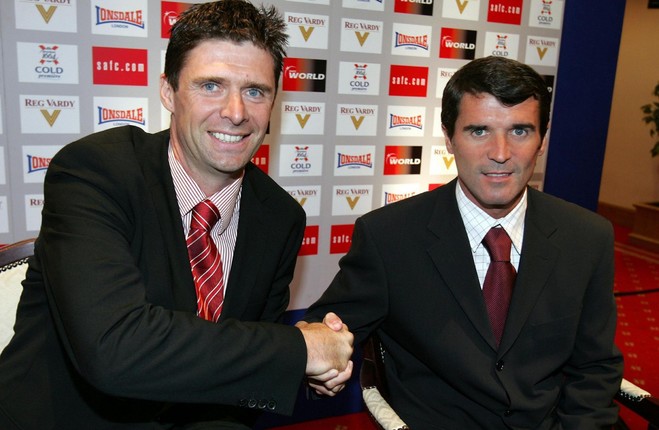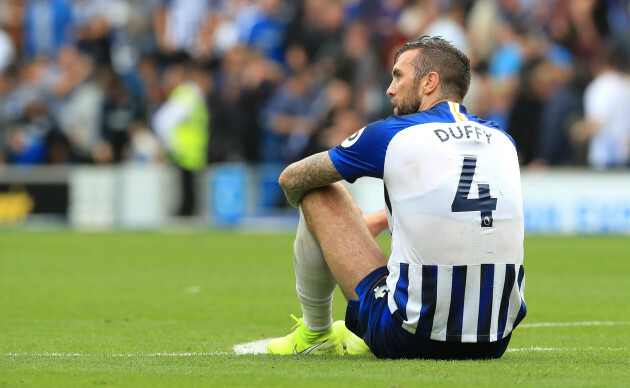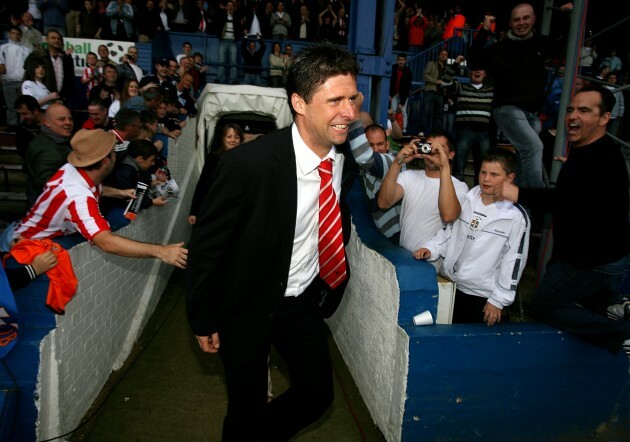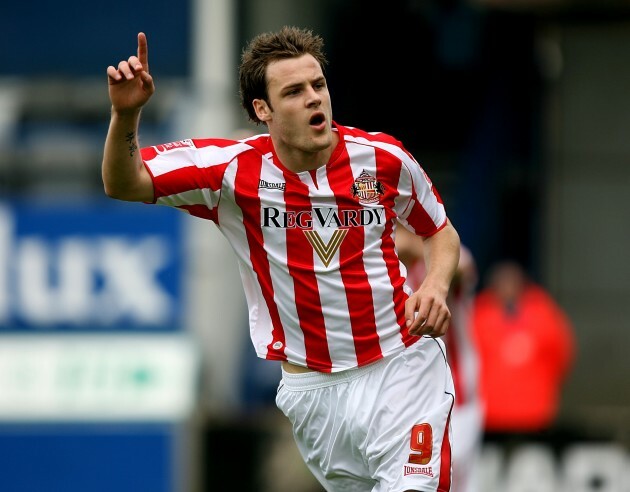TODAY AT THE King Power Stadium and Stamford Bridge, millions of eyes will be drawn to the final episode of the Premier League’s 28th series, a season finale centred on a Champions League storyline.
Can Leicester spook Manchester United? Can sensitive little Frank Lampard get over himself and Liverpool’s taunts? And on a localised level, will you be able to spot a Republic of Ireland international in any of those three sides?
The answer is no. Then again we’re kind of used to this sort of thing, 11 years having passed since there was last an Irish regular at Anfield, eight since there was one at Old Trafford, 14 since Damien Duff was running down Stamford Bridge’s wings, nine since we saw an Irishman hold down a first-team spot at Manchester City, 24 since Eddie McGoldrick did so at Arsenal, nine since Robbie Keane was at Spurs.
If only the sport was like rugby, where the IRFU have the clout to keep their leading players at home and monitor their gametime.
Instead football’s reality leads to talents like Callum O’Dowda and Troy Parrott rotting on substitute benches and first-choice internationals, Darren Randolph and Shane Duffy, twiddling their thumbs for chunks of a season. One sporting body enjoys a high level of control over their players’ club careers; the other is completely powerless.
In an ideal world, it would be different. There’d be some sort of benevolent manipulator who could ensure Ireland’s England-based players got regular action – an Irish owner/cum benefactor who would buy a club and walk the tightrope between satisfying local supporters and championing his country’s cause.
Is this fantasy ever likely to become a reality?
Ask Niall Quinn.
After all it was Quinn who was the driving force behind the Premier League’s uniquely Irish story, when – for two-and-a-half years between 2006 and 2008, the planets were aligned and Sunderland, six-times champions of England, didn’t just have a consortium of Irishmen owning their club but also had an Irish chairman and manager running it.
“A lot of that stuff happened by accident,” Quinn says. “It’s kind of a long story.”
It started in a London hotel in March 2006. Bob Murray, Sunderland’s previous owner, was anxious to sell up, meeting Quinn initially to talk about saving the club’s charitable foundation. It was only when dinner was over and coffee was being served when Murray said he had something else to discuss. “Do you think you’d be interested in buying the club?” Quinn was asked.
He thought it over. Six months earlier he was part of a four-man consortium that was in talks with Shamrock Rovers but for one reason or another, the deal never happened. “Still, the guys (men who’d go on to form the bulk of the Drumaville group) had an itch there that needed to be scratched. I’d a feeling Sunderland might interest them.”
You could see why Quinn would be attracted to the idea, having fallen in love with the area after spending six-years there as a player. Not long retired, he could also see the future with a piercing clarity knowing that while athletically he was considered an old man, in real terms he’d a few decades to put in before it was slippers and pipe time. What else was out there for a retired footballer?
The deal, complex and costly, took three months to complete and for their multi-million pound outlay, a group of eight Irish businessmen found themselves with a skeletal staff, demoralised team and a debt of around £35 million. So two more deals had to be struck, the first with Allied Irish Bank UK, of all firms, to refinance the debt. And then there was their second piece of business.
“I hadn’t spoken to Roy Keane since Saipan,” Quinn says now of the footballing equivalent of the Good Friday peace agreement.
And so in the week Quinn was persuading officials in the City of London to authorise Sunderland’s sale to Drumaville, a footballer called Roy Maurice Keane was calling time on his illustrious playing career. Drumaville wasted no time in calling.
“I wanted to get the deal done as soon as possible,” Quinn says. “Okay, it was our first meeting (since Saipan) but it went really well. I knew what Roy was capable of; knew he’d be just the person to lift the dressing room. And we all know now that he did way more than that. He inspired a city not just a football club.”
It’s easy to forget now, though, that Keane was initially cool on the idea. After mulling over the offer, he pulled out, yet Michael Kennedy, Keane and Quinn’s mutual solicitor, offered sensible advice, suggesting Quinn leave Keane alone until the end of his holiday before asking again.
Even so, Quinn couldn’t pin all his hopes on one person, especially one whose first response was to turn them down. As a result, Martin O’Neill was sounded out; then Sam Allardyce, finally Alan Curbishley. No joy there and with no Roy, either, Sunderland started the 2006/07 season appallingly, losing their first five games including a League Cup tie at Bury. Panic wasn’t far away.
Unbeknownst to Quinn, nor was Keane. He watched Quinn’s post-match interview after the Bury defeat and the following day was back on the phone. “Let’s talk,” he said.
They did more than that. Promotion to the Premier League in their first season was followed by the avoidance of relegation in their second. Midway through his third, Keane resigned, but along the way, something remarkable happened. Fifteen different Irish players featured under Keane, 11 of whom he signed.
All along the intention was to make Sunderland A.F.C. – not Irish football – a better place but the knock-on effects were blindingly obvious. Without Irish owners, it’s unlikely a club as big as Sunderland would have given a then 35-year-old rookie his managerial chance. And without an Irish manager, there’s no way so many Irish players would have got Premier League exposure.
“Truthfully, that wasn’t our plan,” Quinn admits.
Imagine if it became someone’s plan now, though – if an Irish Jack Walker figure was out there, willing to invest in a club and turn it into a refuge centre for Irish players who’d either lost their way or needed an opportunity.
“It’s a bit of a long shot,” Quinn says candidly, “because it’s just not that simple to buy a club, to find one even at Championship level that is for sale and has the potential to go up. Look what we spent in 2006” – (a net total of £5 million on transfers in the August transfer window). “Most of our signings came on frees.
“Like, I remember the summer after we won promotion and Roy wanted to get Craig Gordon. We convened especially in Dublin to talk about that deal; Roy speaking persuasively and powerfully about how a strong goalkeeper was the cornerstone of any team, particularly his successful Manchester United sides. It was a lot of money for us but in the end we went for it.”
Gordon cost £9 million.
“That’s precisely my point. Contrast that figure with the numbers Wolves have spent in the last three years” – (£117m). “It is a different scenario now, a whole different story to 2006 when we went in. It takes serious investment to get a team out of the Championship now and then keep them in the Premier League. Have I any interest in doing something like that again? Look, it took a serious toll the first time. There were too many times when I was getting home (to his Kildare base) just once a fortnight. Looking back, it was far from ideal.”
And yet it was a hell of an adventure. Keane was there for just two-and-a-half seasons, Drumaville for a little longer but Quinn stayed on until 2012. Those were Sunderland’s years of living dangerously, often flirting with relegation, never embracing it. Look at where they were when he arrived; look at where they are now, languishing in League One. They could do with another Drumaville. Then again, so could Irish football.




